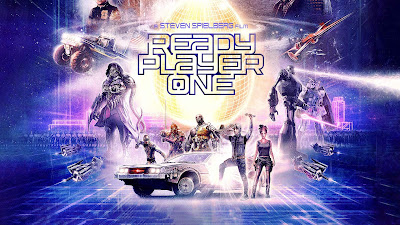The book was released in 2011, prior to the Marvel vs. DC universe wars, prior to Gamergate, prior to a lot of things that seemed to coalesce into "geek nostalgia is bad and toxic." I get it, not being a full fledged geek (or at least not in these realms), I understood from the outside looking in how toxic the environments can appear, and learned how they came to be. I don't read comic books and I'm not a gamer, but I understood the insular, tribal gang nature of these situations that have similar parallels to the recent (and current) political climate. Everything is scorched earth policy, no middle ground.
I read Ready Player One in about three days. Anyone who knows me, knows I read like a snail. But I ate it up, without even understanding half the references. I was excited about the movie for as much as how they were going to pull off the virtual world of the OASIS as telling the story. With Steven Spielberg at the helm, I knew it was in good hands, and I wasn't disappointed. Yes, there are radical changes from the book, from character descriptions to locations to plot points and other important stuff. In reality, Cline, along with Zak Penn and Spielberg, improve upon the book. Much of the book just wasn't going to translate, and that is not a slight. They're too different mediums, they had to change it, I get that.
It is a popcorn movie in the truest Spielberg sense, recalling most closely the thrills and adrenaline of Jurassic Park and, in odd ways, Minority Report. There's no screwball comedy, but there is humor, and wit, and heart, something Spielberg has been able to inject into the blockbuster since his earliest films. I've read criticisms that Wade Watts is a bland lead, or more specifically, that Tye Sheridan is bland. I get that, but it's a tough spot to be in. Over half the movie is his virtual avatar, so we're only getting to really see Wade in short bursts. I've seen mention of Art3mis (Olivia Cooke) should have been the lead, and that's a fair point. Her backstory is more compelling, and having a female lead in a world where action/adventure movies are dominated by male leads would be a welcome thing. However, Mark Twain is attributed a quote (honestly, I don't know if he actually said it) that comes up often: "Write what you know." I don't know Ernest Cline, but I get the feeling there is a lot of him in Wade Watts (the book version). So, if by extension, when he was writing the screenplay version, it didn't occur to him to dramatically change the script and make Art3mis the lead, I don't put that on him.
Lastly, I've seen the take that RPO should have, in some way, criticized or challenged geek culture. While that's a totally reasonable assertion, why this movie? I can't fathom shoehorning in some tsk-tsk'ing for the sake of getting the face of a captive audience and telling them why their geekdom is toxic. Some are reading into this that the kids of 2045 are obsessed with the pop culture of the 1980s, but that's entirely missing the point - they studied it to get inside the head of James Halliday. I don't know if that's lazy journalism, or a complete misread of the plot, or not a proper explanation in the movie itself (which switches to a virtual library in the movie from journals in the book). Point being, nobody asked why Justice League didn't take a moment to criticize all the fanboys who hop on Rotten Tomatoes to crap on Marvel movies and artificially inflate and deflate movie scores.
Cline is supposedly working on a sequel to Ready Player One, so perhaps he'll address some of these issues. I hope he doesn't feel pressured to, either internally or externally. What he delivered back in 2011 was as close to a "popcorn movie" a book can get, and I'd hate for the follow-up to be weighed down by trying to assuage the negativity. There are lot of aspects of pop culture that are simply not for me, and it's a good thing to remember. Not everything is made for everyone, and that's okay.
Lastly, I've seen the take that RPO should have, in some way, criticized or challenged geek culture. While that's a totally reasonable assertion, why this movie? I can't fathom shoehorning in some tsk-tsk'ing for the sake of getting the face of a captive audience and telling them why their geekdom is toxic. Some are reading into this that the kids of 2045 are obsessed with the pop culture of the 1980s, but that's entirely missing the point - they studied it to get inside the head of James Halliday. I don't know if that's lazy journalism, or a complete misread of the plot, or not a proper explanation in the movie itself (which switches to a virtual library in the movie from journals in the book). Point being, nobody asked why Justice League didn't take a moment to criticize all the fanboys who hop on Rotten Tomatoes to crap on Marvel movies and artificially inflate and deflate movie scores.
Cline is supposedly working on a sequel to Ready Player One, so perhaps he'll address some of these issues. I hope he doesn't feel pressured to, either internally or externally. What he delivered back in 2011 was as close to a "popcorn movie" a book can get, and I'd hate for the follow-up to be weighed down by trying to assuage the negativity. There are lot of aspects of pop culture that are simply not for me, and it's a good thing to remember. Not everything is made for everyone, and that's okay.
